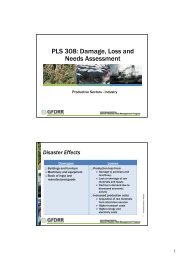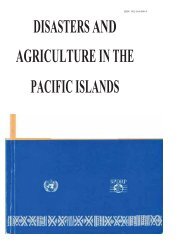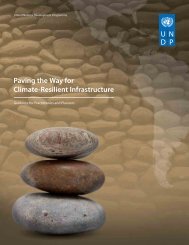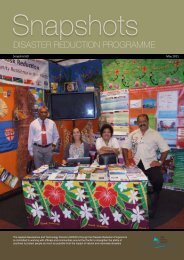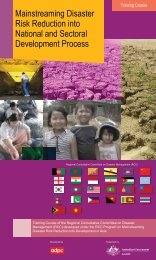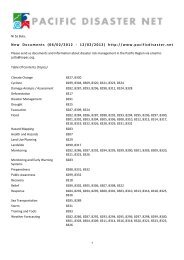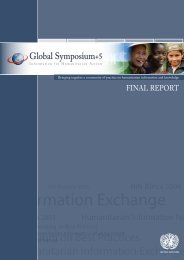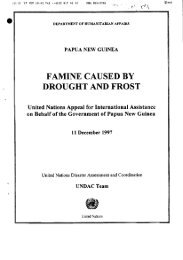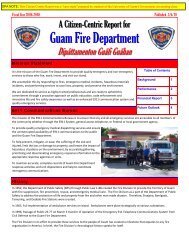A global review of disaster reduction initiatives - Welcome to the ...
A global review of disaster reduction initiatives - Welcome to the ...
A global review of disaster reduction initiatives - Welcome to the ...
You also want an ePaper? Increase the reach of your titles
YUMPU automatically turns print PDFs into web optimized ePapers that Google loves.
5Living with Risk: A <strong>global</strong> <strong>review</strong> <strong>of</strong> <strong>disaster</strong> <strong>reduction</strong> <strong>initiatives</strong>264Political responsibility <strong>to</strong> promote integratedearly warning strategiesThe first requisite for achieving an effectiveearly warning system is recognition <strong>of</strong> <strong>the</strong> value<strong>of</strong> early warning in protecting <strong>the</strong> interests <strong>of</strong>societies and communities. Political willingness<strong>to</strong> use it as a meaningful policy instrument for<strong>disaster</strong> risk management will derive from thisacknowledgement. However, commitment isnot enough. Mobilizing <strong>the</strong> necessary political,human, technical, material and financialresources is needed <strong>to</strong> underpin better warningsthat can avoid, or at least reduce, risks.Governments need <strong>to</strong> support legislation,administration, contingency planning andoperational procedures including inter-ministerial/inter-agencyrelationships. Well-developeddecision-making capacities will avoid <strong>disaster</strong>sthat occur because predictions are consideredas being <strong>to</strong>o uncertain. Governmentsneed <strong>to</strong> take <strong>the</strong> initiative <strong>to</strong> establish, and<strong>the</strong>reafter, maintain <strong>the</strong> necessary collaborativeframework needed for <strong>the</strong> functioning <strong>of</strong> credibleand accountable warning systems. Theyhave <strong>the</strong> responsibility <strong>to</strong> promote integratedearly warning strategies so as <strong>to</strong> gain wide supportfor <strong>the</strong> implementation <strong>of</strong> governmentaldecisions at times <strong>of</strong> crisis. Political <strong>initiatives</strong>and support will guarantee <strong>the</strong> technical andsocial relevance, usefulness and efficiency <strong>of</strong>early warning strategies. One element thatshould increase political commitment <strong>to</strong>wardsearly warning strategies is <strong>the</strong> availability <strong>of</strong>indica<strong>to</strong>rs <strong>to</strong> measure <strong>the</strong>ir effectiveness, especiallyin terms <strong>of</strong> losses avoided and recipientsatisfaction.The following are examples <strong>of</strong> successfulnational early warning systems in use.Mauritius <strong>of</strong>fers an interesting example <strong>of</strong>institutional arrangements according high priority<strong>to</strong> early warning <strong>of</strong> cyclones. The explicitspecifications <strong>of</strong> <strong>the</strong> principal elements <strong>of</strong> <strong>the</strong>cyclone warning dissemination system, includingroles and responsibilities (with details <strong>of</strong>warnings and <strong>the</strong>ir dissemination) are set outin <strong>the</strong> Cyclone and o<strong>the</strong>r Natural DisastersScheme (1995). The Mauritius MeteorologicalOffice is part <strong>of</strong> <strong>the</strong> Prime Minister’sOffice. The Central Cyclone Committee, awell-administered and communication-orientedcentral body, provides leadership <strong>to</strong> ensure<strong>the</strong> effectiveness <strong>of</strong> <strong>the</strong> warning system. Thisendorsement from <strong>the</strong> political centre <strong>of</strong> Mauritiusis a particularly strong and commendablefeature <strong>of</strong> its <strong>disaster</strong> planning from which o<strong>the</strong>rselsewhere can learn. A high degree <strong>of</strong> legitimizationis accorded by this support. Effectiveleadership is provided from a central governmentcommittee in <strong>the</strong> area <strong>of</strong> <strong>disaster</strong> preparedness(including <strong>the</strong> warning system),mitigation and recovery (UK Flagship Programme,1998).SADC countries have long focused attentionon drought and resulting food security issuesfor which early warning and preparednessmechanisms have been developed over <strong>the</strong> lasttwenty years. However, recent extreme wea<strong>the</strong>revents have encouraged a wider perspective forearly warning and more comprehensive <strong>disaster</strong>preparedness activities. Such a shift conveys<strong>the</strong> understanding that potential <strong>disaster</strong>s arerooted in <strong>the</strong> relations between human actions,environmental conditions, management <strong>of</strong> naturalresources and <strong>the</strong> climate. Therefore additionalwarning requirements need <strong>to</strong> beaddressed through policies that can provide anintegrated regional early warning and <strong>disaster</strong>preparedness framework. Necessary steps havebeen taken through <strong>the</strong> development <strong>of</strong> aframework for a multisec<strong>to</strong>ral <strong>disaster</strong> managementstrategy supported by UNDP.Ano<strong>the</strong>r step forward was made through <strong>the</strong>process launched by SADC heads <strong>of</strong> State andGovernment following <strong>the</strong> devastating floodsin Sou<strong>the</strong>rn Africa in early 2000. This initiativeprovides a good example <strong>of</strong> political willingness<strong>to</strong> improve early warning and preparednesscapacities. A <strong>review</strong> <strong>of</strong> <strong>the</strong> contributionsthat meteorological and hydrological servicesprovide <strong>to</strong> early warning and <strong>disaster</strong> preparednessresulted in recommendations forpolitical decisions <strong>to</strong> boost regional early warningstrategies. Recommendations included <strong>the</strong>need for SADC countries <strong>to</strong> create a policy thatis more focused on regional requirements forearly warning and <strong>disaster</strong> preparedness. Toachieve this, <strong>the</strong> formulation and progressiveimplementation <strong>of</strong> a structured regionalapproach was proposed, able <strong>to</strong> link increasednational capacities <strong>to</strong> improve early warning. Itwas also recommended that adequate fundingbe provided <strong>to</strong> national institutions <strong>to</strong> equip<strong>the</strong>m with <strong>the</strong> necessary facilities and <strong>to</strong>ols <strong>to</strong>maintain <strong>the</strong>ir high level <strong>of</strong> public service in<strong>the</strong> national interest, and <strong>to</strong> enable <strong>the</strong>m <strong>to</strong>



